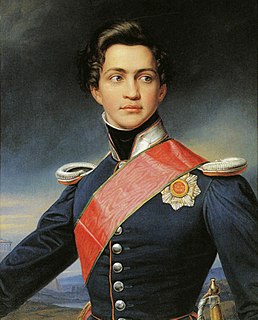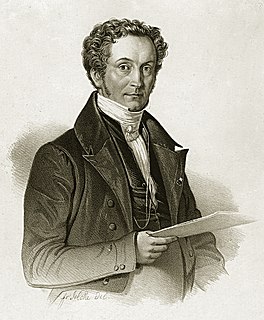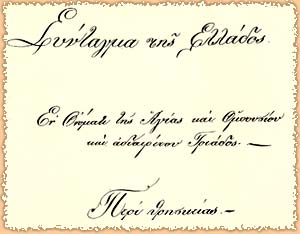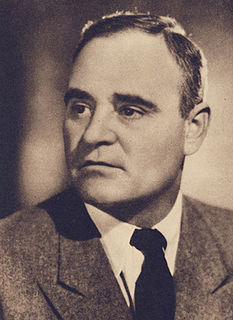
Otto was a Bavarian prince who ruled as King of Greece from the establishment of the monarchy on 27 May 1832, under the Convention of London, until he was deposed on 23 October 1862.

The prime minister of the Hellenic Republic, colloquially referred to as the prime minister of Greece, is the head of government of the Hellenic Republic and the leader of the Greek Cabinet. The incumbent prime minister is Kyriakos Mitsotakis, who took office on 8 July 2019 from Alexis Tsipras.

Ioannis Kolettis was a Greek politician who played a significant role in Greek affairs from the Greek War of Independence through the early years of the Greek Kingdom, including as Minister to France and serving twice as Prime Minister.

Federal elections were held in Germany on 19 January 1919, although members of the standing army in the east did not vote until 2 February. The elections were the first of the new Weimar Republic, which had been established after World War I and the Revolution of 1918–19, and the first with women's suffrage. The previous constituencies, which heavily overrepresented rural areas, were scrapped, and the elections held using proportional representation. The voting age was also lowered from 25 to 20. Austrian citizens living in Germany were allowed to vote, with German citizens living in Austria being allowed to vote in the February 1919 Constitutional Assembly elections.

Dimitrios Kallergis was a fighter of the Greek War of Independence, major general, politician and one of the most important protagonists of the 3 September 1843 Revolution.
The Greek national assemblies are representative bodies of the Greek people. During and in the direct aftermath of the Greek War of Independence (1821–1832), the name was used for the insurgents' proto-parliamentary assemblies. Thereafter, the term has been used for a number of extraordinary assemblies chiefly in regard to changes in the Constitution and the form of government of Greece.
In the modern history of Greece, starting from the Greek War of Independence, the Constitution of 1975/1986/2001 is the last in a series of democratically adopted Constitutions.

Ignaz Ritter von Rudhart was a Bavarian scholar and public servant who was dispatched to Greece to serve as President of the Privy Council during the reign of King Otto.

The history of the Hellenic Republic constitutes three republican periods in the modern history of Greece: from 1822 until 1832; from 1924 until 1935; and from 1974 through to the present. See also the constitutional history of Greece.

The first constitution of the Kingdom of Greece was the Greek Constitution of 1844. On 3 September 1843, the military garrison of Athens, with the help of citizens, rebelled and demanded from King Otto the concession of a Constitution.

The 3 September 1843 Revolution, was an uprising by the Hellenic Army in Athens, supported by large sections of the people, against the autocratic rule of King Otto. The rebels, led by veterans of the Greek War of Independence, demanded the granting of a constitution and the departure of the Bavarian officials that dominated the government. The revolution succeeded, ushering the period of constitutional monarchy and universal suffrage in Greece.

The president of the Hellenic Parliament is the presiding officer of the Parliament of Greece. The president's term coincides with the term of the assembly, and he or she is chosen by a vote during the opening session, after each legislative election. Following is a list of speakers of the Hellenic Parliament or other national legislative bodies such as the Greek Senate, from the time of the Greek War of Independence till present. The official order of precedence ranks the speaker of the Hellenic Parliament in the 3rd position, after the president of the Republic and the prime minister.
Constantine N. Levidis was a Greek scholar, writer, editor, considered as 'the father of Greek journalism'. Noted for his attempt to turn the Kingdom of Greece into a constitutional monarchy.
Constitutional Assembly elections were held in Bulgaria on 10 June 1990, with a second round for eighteen seats on 17 June. They were the first elections held since the fall of Communism the previous winter, and the first free national elections since 1931. The elections were held to elect the 7th Grand National Assembly, tasked with adopting a new (democratic) constitution. The new electoral system was changed from 400 single-member constituencies used during the Communist era to a split system whereby half were elected in single member constituencies and half by proportional representation. The result was a victory for the Bulgarian Socialist Party, the freshly renamed Communist Party, which won 211 of the 400 seats. Voter turnout was 90.3%.
The Fifth National Assembly of the Greeks convened at Argos on 5 December 1831, before relocating to Nafplion in early 1832.

Constitutional Assembly elections were held in Latvia on 17 and 18 April 1920. The Latvian Social Democratic Workers' Party emerged as the largest party in the Constitutional Assembly, winning 57 of the 150 seats. The elections were boycotted by communist parties. The Constitutional Assembly was responsible for drafting a constitution, which was approved on 15 February and promulgated on 7 November 1922.
Elections for the Constituent Assembly were held in Denmark on 5 October 1848. Of the 158 seats in the Assembly, 114 were elected and 44 appointed by the King. An additional 31 candidates were to come from the Duchy of Schleswig but were not elected due to the First Schleswig War.
Parliamentary elections were held in Greece between June and August 1844. Supporters of Andreas Metaxas emerged as the largest block in Parliament. However, Ioannis Kolettis became Prime Minister on 18 August.

Parliamentary elections were held in Romania on 30 November 1952. They were the second held under the Socialist Republic of Romania, and the first under a constitution adopted that September. They were also the first held after longtime Prime Minister Petru Groza handed the post to Communist Party leader Gheorghe Gheorghiu-Dej, who had been the country's de facto leader since the Communists seized full power in 1947.











